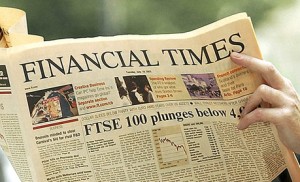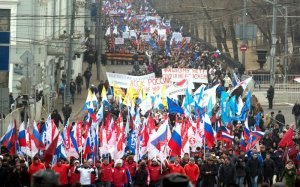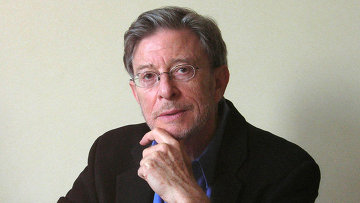
Courtney Weaver and Jack Farchy in Moscow
.
In mid-March, as sanctions were imposed on Russia over its part in the Ukraine crisis, the White House made a bold stock market prediction.
"I wouldn’t, if I were you, invest in Russian equities right now,” quipped press secretary Jay Carney, "unless you’re going short.”
Three months later these remarks look like a joke. Russian markets have since embarked on an epic turnround, with many of the country’s blue-chips now up for the year.Though heavy fighting continues in eastern Ukraine, the market has welcomed a theoretical ceasefire between Kiev and the rebels, as well as continuing talks between Russian president Vladimir Putin and Ukraine’s Petro Poroshenko.
Over the past three months, Russia’s RTS index has been the third best-performing exchange worldwide, having risen 33 per cent from its mid-March low. On Tuesday, after Mr Putin asked Russia’s upper house of parliament to cancel a mandate to send troops into Ukraine, the index added 3.8 per cent.
While the US and EU are both warning of additional sanctions against Russia, investors have shrugged off the threat.
Among Russia’s best market performers have been those stocks that were believed to be most at risk of sanctions. Gas group Novatek has added 37 per cent since the US Treasury placed sanctions on its shareholder Gennady Timchenko in March and is up 7 per cent for the year. Rosneft has gained 17 per cent since its chief executive Igor Sechin was placed under sanctions in April and is up for the year.
State-owned lender VTB has gained close to 40 per cent since it hit a three-year low in March, even though the bank is seen as a potential target for US sanctions.
Other Russian state companies that have performed well include Russia’s largest lender Sberbank, which has risen 23 per cent since the March trough, and Gazprom, which is up 30 per cent since March and 10 per cent year-to-date.
While some big-name institutional investors may have heeded Mr Carney’s warning, any hedge funds that bought at the bottom of the market will have made impressive returns. Long-term Russia watchers who held on to their positions will also have benefited from the rally, though many Russia-focused funds concede they are still down year-to-date.
"Some of the Russia-dedicated international investors and deep-pocketed local Russian investors were buying the market aggressively late April into May. They had the ability to look through the hysteria and pick up value,” says Joseph Dayan, head of markets at BCS Financial Group, one of Russia’s largest brokers.
 "The dedicated investors realised fairly quickly that the sanctions were so far toothless and the association of Timchenko to Novatek was irrelevant to Novatek operationally.”
"The dedicated investors realised fairly quickly that the sanctions were so far toothless and the association of Timchenko to Novatek was irrelevant to Novatek operationally.”
On the local market, brokers speculate that not all Moscow buyers were working on luck alone. On the morning of May 7, for instance, BCS noted that many local investors were suddenly going long on RTS futures, reversing a month-long trend, while international investors were still sitting on the sidelines.
A few hours later, Mr Putin unexpectedly voiced his support for Ukraine’s upcoming presidential election and attempted to distance himself from Ukraine’s pro-Russia separatists – his most conciliatory comments on the crisis to-date. The RTS ended the day 5 per cent higher.
Mr Sechin spent some $30m buying shares in Rosneft in the days after the first round of sanctions was announced – a trade which has returned more than 10 per cent to date. "Businessmen should try to take advantage of every situation,” he said at the time.
Leonid Mikhelson, Novatek’s chief executive, also bought shares on several occasions in March and April, according to regulatory filings.
 Russia’s market rebound has coincided with a wider recovery for emerging markets – the MSCI emerging markets index is up nearly 14 per cent since March – as well as a rise in oil prices, boosted by violence in Iraq.
Russia’s market rebound has coincided with a wider recovery for emerging markets – the MSCI emerging markets index is up nearly 14 per cent since March – as well as a rise in oil prices, boosted by violence in Iraq.
"Russia moves in sync with global emerging-market flows,” says Steven Dashevsky, founder of the fund Dashevsky & Partners. The broader emerging markets equity rally was a "saved by the bell” moment for Russia.
The equity rally has also helped reopen Russian capital markets. Earlier this week, Sberbank issued a €1bn five-year eurobond, its first since the Ukraine crisis, and Gazprombank, is in talks with European investors for its own eurobond placement.
In equities, Bashneft and the Russian subsidiary of Germany’s Metro are both looking at moving forward with initial public offerings, potentially by the end of this year. Hypermarket chain Lenta, the only Russian company that managed to pull off a London flotation ahead of Russia’s involvement in Ukraine, is now up 27 per cent since its IPO in late February.
Yet analysts warn the rally may be nearing its peak. VTB Capital says that "further headroom for the Russian stock market is limited” due to "the lasting violence in Ukraine” as well as domestic factors.
It forecasts zero economic growth for Russia this year.













